Résultats de recherche de titre
Articles 1 à 6 sur 6
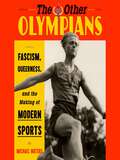
The other olympians: Fascism, queerness, and the making of modern sports
Par Michael Waters. 2024
"Michael Waters performs an Olympian act of storytelling, using the stories of these extraordinary athletes to explore in brilliant detail…
the struggle for understanding and equality." —Jonathan Eig, author of King: A Life The story of the early trans athletes and Olympic bureaucrats who lit the flame for today's culture wars. In December 1935, Zdenek Koubek, one of the most famous sprinters in European women's sports, declared he was now living as a man. Around the same time, the celebrated British field athlete Mark Weston, also assigned female at birth, announced that he, too, was a man. Periodicals and radio programs across the world carried the news; both became global celebrities. A few decades later, they were all but forgotten. And in the wake of their transitions, what could have been a push toward equality became instead, through a confluence of bureaucracy, war, and sheer happenstance, the exact opposite: the now all-too-familiar panic around trans, intersex, and gender nonconforming athletes. In The Other Olympians , Michael Waters uncovers, for the first time, the gripping true stories of Koubek, Weston, and other pioneering trans and intersex athletes from their era. With dogged research and cinematic flair, Waters also tracks how International Olympic Committee members ignored Nazi Germany's atrocities in order to pull off the Berlin Games, a partnership that ultimately influenced the IOC's nearly century-long obsession with surveilling and cataloging gender. Immersive and revelatory, The Other Olympians is a groundbreaking, hidden-in-the-archives marvel, an inspiring call for equality, and an essential contribution toward understanding the contemporary culture wars over gender in sports. A Macmillan Audio production from Farrar, Straus and Giroux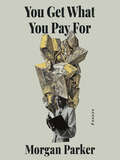
You get what you pay for: Essays
Par Morgan Parker. 2024
In her “witty and searing” first essay collection, award-winning poet Morgan Parker examines “the cultural legacy of Black womanhood and…
the meaning of finding ‘well-being’ in a world that wasn’t built for you” ( Vogue ). Dubbed a voice of her generation, poet and writer Morgan Parker has spent much of her adulthood in therapy, trying to square the resonance of her writing with the alienation she feels in nearly every aspect of life, from her lifelong singleness to a battle with depression. She traces this loneliness to an inability to feel truly safe with others and a historic hyperawareness stemming from the effects of slavery. In a collection of essays as intimate as being in the room with Parker and her therapist, Parker examines America’s cultural history and relationship to Black Americans through the ages. She touches on such topics as the ubiquity of beauty standards that exclude Black women, the implications of Bill Cosby’s fall from grace in a culture predicated on acceptance through respectability, and the pitfalls of visibility as seen through the mischaracterizations of Serena Williams as alternately iconic and too ambitious. With piercing wit and incisive observations, You Get What You Pay For is ultimately a portal into a deeper examination of racial consciousness and its effects on mental well-being in America today. Weaving unflinching criticism with intimate anecdotes, this devastating memoir-in-essays paints a portrait of one Black woman’s psyche—and of the writer’s search to both tell the truth and deconstruct it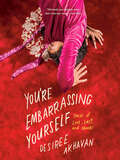
You're embarrassing yourself: Stories of love, lust, and movies
Par Desiree Akhavan. 2024
Writer, actor, and director Desiree Akhavan shares the stories she was told to shut up about—hilarious, horny, heartbreaking tales of…
a life in pursuit of art, love, and a better haircut. “Hilariously raw, relatable, and—dare I even say—sexy.”—Jessi Klein When it comes to shame, Desiree Akhavan knows what she’s talking about—whether it’s winning the title of the Ugliest Girl at her high school, acquiescing to the nose job she was lovingly forced into by her Iranian parents, or losing her virginity to a cokehead she met in a support group for cutters. In You’re Embarrassing Yourself, Akhavan goes to the rawest places—the lifelong struggle to be at peace in one’s body, the search for home as the child of immigrants, the anxious underbelly of artistic ambition—in pursuit of wisdom, catharsis, and lolz. Equal parts funny and heartfelt, these seventeen essays chart an artist’s journey from outcast to overnight indie darling, to (somewhat) self-aware adult woman. The result is a collection that captures the pathetic lows and euphoric highs of our youth—and how to survive them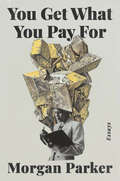
You Get What You Pay For: Essays
Par Morgan Parker. 2024
The award-winning author of Magical Negro traces the difficulty and beauty of existing as a Black woman through American history,…
from the foundational trauma of the slave trade all the way up to Serena Williams and the aftermath of Hurricane Katrina&“An engrossing journey through Parker&’s expansive and gifted mind.&”—Clint Smith, author of How the Word Is PassedDubbed a voice of her generation, poet and writer Morgan Parker has spent much of her adulthood in therapy, trying to square the resonance of her writing with the alienation she feels in nearly every aspect of life, from her lifelong singleness to a battle with depression. She traces this loneliness to an inability to feel truly safe with others and a historic hyperawareness stemming from the effects of slavery.In a collection of essays as intimate as being in the room with Parker and her therapist, Parker examines America&’s cultural history and relationship to Black Americans through the ages. She touches on such topics as the ubiquity of beauty standards that exclude Black women, the implications of Bill Cosby&’s fall from grace in a culture predicated on acceptance through respectability, and the pitfalls of visibility as seen through the mischaracterizations of Serena Williams as alternately iconic and too ambitious.With piercing wit and incisive observations, You Get What You Pay For is ultimately a portal into a deeper examination of racial consciousness and its effects on mental well-being in America today. Weaving unflinching criticism with intimate anecdotes, this devastating memoir-in-essays paints a portrait of one Black woman&’s psyche—and of the writer&’s search to both tell the truth and deconstruct it.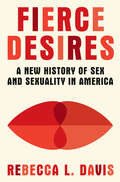
Fierce Desires: A New History of Sex and Sexuality in America
Par Rebecca L. Davis. 2024
From an esteemed scholar, a richly textured, authoritative history of sex and sexuality in America—the first major account in three…
decades. Our era is one of sexual upheaval. Roe v. Wade was overturned in the summer of 2022, school systems across the country are banning books with LGBTQ+ themes, and the notion of a “tradwife” is gaining adherents on the right while polyamory wins converts on the left. It may seem as though debates over sex are more intense than ever, but as acclaimed historian Rebecca L. Davis demonstrates in Fierce Desires, we should not be too surprised, because Americans have been arguing over which kinds of sex are “acceptable”—and which are not—since before the founding itself. From the public floggings of fornicators in early New England to passionate same-sex love affairs in the 1800s and the crackdown on abortion providers in the 1870s, and from the movements for sexual liberation to the recent restrictions on access to gender affirming care, Davis presents a sweeping, engrossing, illuminating four-hundred-year account of this nation’s sexual past. Drawing on a wealth of sources, including legal records, erotica, and eighteenth-century romance novels, she recasts important episodes—Anthony Comstock’s crusade against smut among them—and, at the same time, unearths stories of little-remembered pioneers and iconoclasts, such as an indentured servant in colonial Virginia named Thomas/Thomasine Hall, Gay Liberation Front cofounder Kiyoshi Kuromiya, and postwar female pleasure activist Betty Dodson. At the heart of the book is Davis’s argument that the concept of sexual identity is relatively novel, first appearing in the nineteenth century. Over the centuries, Americans have shifted from understanding sexual behaviors as reflections of personal preferences or values, such as those rooted in faith or culture, to defining sexuality as an essential part of what makes a person who they are. And at every step, legislators, police, activists, and bureaucrats attempted to regulate new sexual behaviors, transforming government in the process. The most comprehensive account of America’s sexual past since John D’Emilio and Estelle Freedman’s 1988 classic, Intimate Matters, Davis’s magisterial work seeks to help us understand the turmoil of the present. It demonstrates how fiercely we have always valued our desires, and how far we are willing to go to defend them.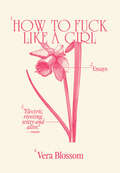
How to Fuck Like a Girl: Essays
Par Vera Blossom. 2024
A cheeky how-to guide, as raunchy as it is heartfelt, from a bright new literary voice.A bold and vulnerable collection…
from a new, young voice, How to Fuck Like a Girl is a daring mash-up of pillow book, grimoire, and manifesto by writer Vera Blossom. From hooking up to trans witchcraft, petty crime, capitalism, friendships, divorce, and survival, Blossom brings wit and melancholy, grandeur and smarts, debuting a bright literary voice as raunchy as it is heartfelt. A cheeky how-to guide that earnestly asks if it is possible to fuck oneself into girlhood, How to Fuck Like a Girl is a cult classic in the making.